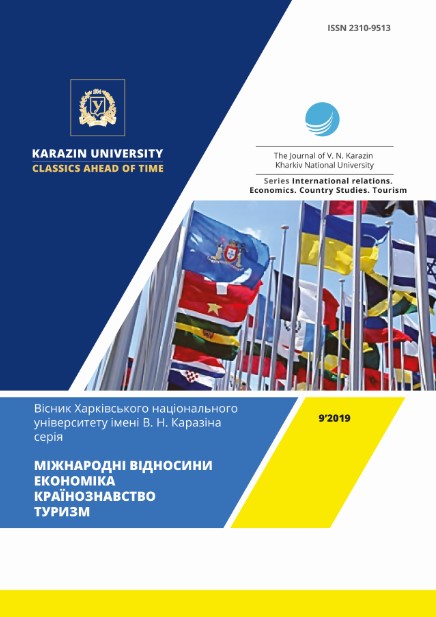Research on the development of space tourism:problems and prospects
Abstract
An increasing demand for space travel, the creation of commercial enterprises and travel agencies in the field of space industry, the development of vehicles intended solely for the transportation of tourists to space – all this suggests that space can soon turn from a matter of scientific research into a tourist destination. Therefore, today the study of the state and prospects of space tourism development is a hot topic. The subject of research in the article is the development of space tourism in the world. The goal is to identify the main factors constraining the development of space tourism in the world. The objectives are to explore the economic benefits of space tourism development and the possibility of increasing commercial enterprises in the field of space industry; to evaluate key concepts involved in developing ways to reduce or eliminate social, economic problems arising in the field of space tourism. General scientific methods used: system analysis and factor analysis. The results of this study: the main economic advantages, disadvantages and problems of space tourism have been revealed; the state have been analyzed, and prospects for the development of space tourism have been identified; the need to study the fundamentals of space tourism development in the future have been determined, its impact on society and those who participate in it, the importance of upcoming efforts and possible policy recommendations have been evaluated. Special attention is paid to the review of space law treaties, agreements and conventions on space tourism. The authors conclude that space tourism is showing rapid development, and the space industry remains one of the promising investment sectors which may become the main direction of development of space activities in the future. Because space tourism is a certain market niche that can contribute to the use of infrastructure in space, especially due to the upcoming discoveries.
Downloads
References
Andrew A. (2001). Cash 2021: Commercial Access and Space Habitation. Astronautica vol. 51; No1-9; pp.637-646
Anon. (2003). The Economic Impact of Commercial Space Transportation on the U.S. Economy: 2002 Results and Outlook for 2010. FAA, Associate Administrator for Commercial Space Transportation.
Ashford D. (2003). Spaceflight Revolution. London: Imperial College Press.
Ashford D., Collins, P. (1990). Your Spaceflight Manual: How you could be a tourist in space within 20 years. London : Eddison – Saad.
Babenko V., Kulczyk Z., Perevosova I., Syniavska O. and Davydova O. (2019). Factors of the development of international e-commerce under the conditions of globalization. SHS Web of Conferences, 65, pp. 10-16. doi: https://doi.org/10.1051/shsconf/20196504016
Babenko V., Sidorov V., Pankova Ju. (2017). Modern imperatives of the development of the integration of foreign economic policy of Ukraine in the modern world economic space: monograph, International economic relations and sustainable development [edited by Dr. of Economics, Prof. O. Prokopenko, Ph.D in Economics T. Kurbatova], Ruda Śląska: Drukarnia i Studio Graficzne Omnidium, pp. 51-70.
Bekey I. (1998). Economically Viable Public Space Travel. Proceedings of 49th IAF Congress. Available at: http://www.spacefuture.com/archive/economically_viable_public_ space_travel.shtml
Cater Iain Carl (2010). Steps to Space: opportunities for astro tourism Development. Tourism Management. Elsevier Ltd.; DOI: 10.1016/j.tourman.2009.09.001
Collins P. (2004). Space Tourism: Recent Progress and Future Prospects. Space Technology and Applications International Forum (STAIF-2004). Available at: http://www.spacefuture.com/archive/space_tourism_recent_progress_and_future_prospects.shtml
Collins P. (2006). The Economic Benefits of Space Tourism. JBIS. Vol 59, pp 400-411
Collins P., Ashford D. (1986). Potential Economic Implications of the Development of Space Tourism. IAF paper no IAA-86-446. Available at: http://www.spacefuture.com/archive/potential_economic_implications_of_the_development_of_space_tourism.shtml
Convention on Registration of Objects Launched into Outer Space. Available at: http://www.unoosa.org/oosa/en/ourwork/spacelaw/treaties/introregistration-convention.html
De Selding P. (2006). Industry, ESA Air Grievances During Space Days Meeting. Space News. Vol. 17, No. 23.
Isozaki K. (1998). Status Report on Space Tour Vehicle Kankoh-Maru of Japanese Rocket Society. IAF paper no IAA-98-IAA.1.5.06. Available at: http://www.spacefuture.com/archive/status_report_on_space_tour_vehicle_kankoh_maru_of_japanese_ rocket_society.shtml
Niskanen W. (1971). Bureaucracy and Representative Government. Edward Elgar Press. Chicago : Alone Atherton.
O'Neil. (1998). General Public Space Travel and Tourism - Volume 1 Executive Summary. NASA/STA, NP-1998-03-11-MSFC. Available at: http://www.spacefuture.com/archive/general_public_ space_travel_and_tourism.shtml
Sidorov V.I., Babenko V.A., Perepelitsia A.S. (2016). Clusterization the Countries by the Level Information in the Conditions of International Globalization. International Scientific Conference. The Development of International Competitiveness: State, Region, Enterprise: Conference Proceeding, Part 1, December 16, 2016. Lisbon, Portugal: Baltija Publishing, pp. 11-15.
Treaty on Principles Governing the Activities of States in the Exploration and Use of Outer Space, including the Moon and Other Celestial Bodies. Available at: http://www.unoosa.org/oosa/en/ourwork/spacelaw/treaties/outerspacetreaty.html
Webber D. (2003). Public Space Markets - What We Know and What We Don't Know. STAIF 2003 Albuquerque. Available at: http://www.spacefuture.com/archive/public_space_markets_ what_we_know_ and_what_we_dont_know.shtml
Authors who publish with this journal agree to the following terms:
- Authors retain copyright and grant the journal right of first publication of this work under the terms of a license Creative Commons Attribution License 4.0 International (CC BY 4.0).
- Authors are able to enter into separate, additional contractual arrangements for the non-exclusive distribution of the journal's published version of the work (e.g., post it to an institutional repository or publish it in a book), with an acknowledgement of its initial publication in this journal.
- Authors are permitted and encouraged to post their work online (e.g., in institutional repositories or on their website) prior to and during the submission process, as it can lead to productive exchanges, as well as earlier and greater citation of published work.




